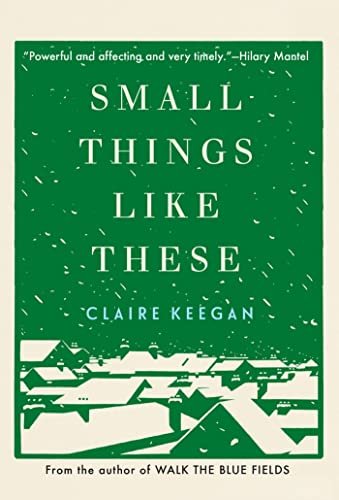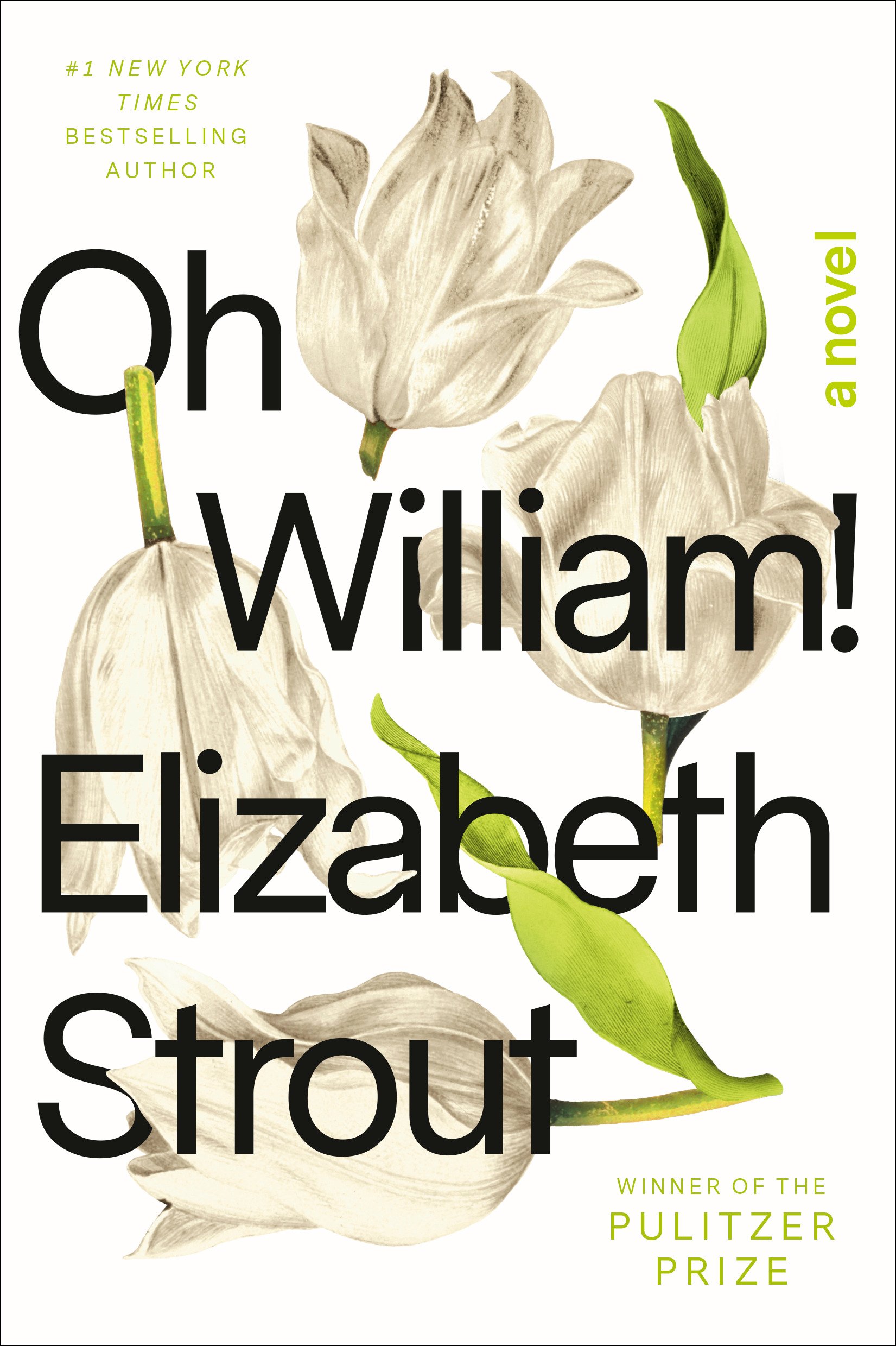
Recent Reviews

Small Things Like These by Claire Keegan
Despite its tranquil tone, Claire Keegan’s ‘Small Things Like These’ packs a provocative punch. In 114 pages, she delves into the heart and mind of a man questioning the purpose of his life. After witnessing a disturbing event, his past comes rushing into the present. Short-listed for this year’s Booker Prize, this small novel inspires,
Christmas is fast approaching in the small Irish town where Bill Furlong was born, raised and still lives. The year is 1985 and an economic downturn has enveloped the town. But Bill, a coal merchant, feels fortunate he can still support his wife and five daughters.
One day delivering coal to the Catholic convent for unwed mothers, Bill finds a young woman locked in the coal shed. It shakes him deeply and unearths thoughts about his own unwed mother. When Bill’s mother had become pregnant at 16, her family disowned her. Because the Protestant woman for whom Bill’s mother worked invited Bill’s mother to move in and raise her child, Bill’s mother was spared the convent for unwed mothers. A blessing for Bill and his mother.
What Bill saw at the convent begins to plague him. His wife says, “If you want to get on in life, there are things you have to ignore, so you can keep on.” But the image of that young, scared girl upsets the compassionate Bill Furlong. His relationship with the nuns is cordial, but still, his conscience won’t rest. “Why were the things that were closet so often the hardest to see?” Feelings about his deceased mother and his unknown father stir inside him. Bill begins to reevaluate his obligations to himself, his family and his community. He wonders, “Was there any point in being alive without helping one another?”
Claire Keegan’s sparse prose grabs her readers and places them in Bill Furlong’s heart and mind. In these turbulent times, she provokes her readers to contemplate their responsibilities to others. If each of us does one small compassionate act, our world would undoubtedly be a better place. 4/5

Oh William! by Elizabeth Strout
Elizabeth Strout is one of my favorite authors. No doubt, this Pulitzer Prize winner is a talented writer. But what I admire most is her persistent probing into the human psyche. What does it mean to be a person? Can we know ourselves? Can we really know the people we love? Strout’s books quietly invite readers to reflect on the nuances of family relationships. If you haven't read ‘Olive Kittredge’ and ‘The Burgess Boys’, I highly recommend them.
With “Oh William!” Strout explores the dynamics of a marriage. She revisits Lucy Barton, the protagonist of her last two novels. Lucy’s beloved second husband, David, has died, and Lucy has been pondering her life while grieving. Her ex-husband William, the father of her grown daughters, asks Lucy to join him on a road trip to Maine. His second wife has left him, and he wants to investigate a recently uncovered family secret. Romance is not the motivation; William needs Lucy’s company. Throughout their short adventure, Lucy thinks more specifically about her relationship with William and her initial attraction to him. With the passing of time and the help of a therapist, she is aware of just how little she knew about herself and William. Though her marriage lasted twenty years, she thinks, “William had always been a mystery to me. I am only saying: I wondered who William was.” Of course, she knew intimately William’s likes, dislikes, preferences and needs. But Lucy is wondering about something more profound, more complicated about their relationship.
Though Lucy is a successful 63-year-old writer living in New York City, she is still naïve and trapped within her youthful feelings of invisibility. Her voice is passive and distant. She has not psychologically moved beyond her impoverished childhood filled with neglect and disregard. Grateful for her writing career and kindhearted daughters, Lucy still doesn’t believe she deserves happiness. She tolerated William’s bad behavior in their marriage while making poor judgments herself. She reflects, “Who ever really knows the experience of another?”
Driving with William for hours in a car creates an opportunity for Lucy to understand more. Lucy and William query each other about different moments in their marriage and share their perspectives. The discovery of William’s family secret enriches their conversation.
When they return to their separate lives in New York City, Lucy comprehends a bit more about herself and her life with William. Without angst, she states on the final page, “Everybody in this whole wide world, we do not know anybody, not even ourselves! Except a little tiny, tiny bit we do. But we are all mythologies, mysterious. We are all mysteries.”
This short novel is packed with thought-provoking insights about marriage and the complexities of human relationships. Another gem by Elizabeth Strout. 4/5

Properties of Thirst by Marianne Wiggins
The Japanese surprise attack on Pearl Harbor on December 7, 1941 pushed a shocked America into WWII. Few Americans were unmarked by what followed. Marianne Wiggins’ epic new novel ‘Properties of Thirst’ immerses readers into the life of one California ranching family in the aftermath of the attack. The book is a poignant love story, a family saga, and a portrayal of political events shaping personal lives. ‘History will always find you’ is Wiggins’ persistent theme. The building of a Japanese American internment camp and the water wars of the Owens Valley are how history finds this corner of California.
The story is set in Lone Pine, a tiny town nestled between the Sierra and Inyo Mountain ranges where many Hollywood Westerns have been filmed. Mt. Whitney stands tall in the distance. This idyllic location is where Wiggins begins her novel.
Rocky Rhodes had inherited his father’s fortune when he was a young man and transformed himself from an elite educated Manhattanite to a rugged California rancher. He built a beautiful adobe home in Lone Pine for his bride Lou. They adorned their home with fine furniture, rugs, paintings, and bookshelves that included Rocky’s favorite authors: Emerson and Thoreau. When his wife died of polio, and Rocky’s grief was raw, his sister moved West to help him raise his three-year-old twins, Stryker and Sunny.
In the decades since Rocky had moved West, the Los Angeles Water corporation had been buying the water rights of properties around Lone Pine, making farming untenable. But Rocky won’t sell his water rights. Through litigation and civil disobedience, Rocky has been battling L.A. Water to save the land he loves. “You can’t save what you don’t love” is the opening line and another recurring theme. Rocky detests L.A. Water for diverting the Owens River to Los Angeles decades earlier. He had watched Owens Lake dry up, asthma rates rise, and wildlife habitat wither.
After Pearl Harbor, the citizens of Lone Pine learn that the United States government will build a Japanese American internment camp called Manzanar, adjacent to Rocky’s property. The government sends a young lawyer named Schiff to design, develop and manage the camp. Ten thousand Japanese Americans from San Francisco and other places in the West will soon be incarcerated. Schiff succeeds in building the camp but eventually loathes the injustice and covertly helps the Japanese Americans. The Rhodes family and the Lone Pine community must also decide how to respond. Meanwhile, Schiff falls in love with Rocky’s grown daughter, Sunny, a rancher, gifted cook, and compelling character.
Wiggins has created a remarkable novel. (All the more remarkable as she overcame a stroke to finish it with help from her daughter, Lara Porzak.) Wiggins sketches her characters in rich nuance and captures California’s natural beauty in reverent detail. Readers are transported into the ethos and spirit of the 1940s American West. Though the family story is front and center, Wiggins illuminates the environmental despoilment and racial prejudice that have plagued our past. ‘Properties of Thirst’ is a superb saga of this history that always finds us.
